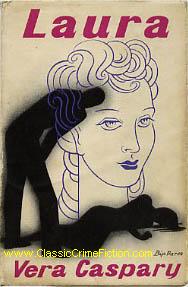You’ve gone away for the weekend. You’re a tourist, on vacation. You’re wandering around, eating fudge and salt-water taffy, looking at the historic buildings, trying to decide if the shape in the water is a seal or a rock. When you get back to your hotel, you look up the local used bookstore. “Let’s stop by, before we go kayaking,” you might say to your companion. This is why: Continue reading
Category - Books
Inversion on the Beach
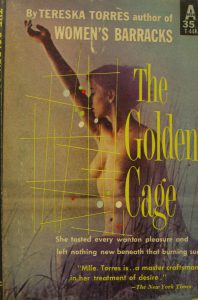 The Golden Cage, Tereska Torrès (1959, Avon, published by arrangement with the Dial Press)
The Golden Cage, Tereska Torrès (1959, Avon, published by arrangement with the Dial Press)
“Miss Torres is a very naughty Aphrodite presiding over a multitude of libidinous extravaganzas.” (Parade of Books)
Some pulps are meant to be skimmed, and the works of Tereska Torrès belong to that category. She favors the Grand Hotel approach to fiction: a group of disparate people are brought together by unusual circumstances and Tereska tells us a series of colorful, unrelated stories about them. She used this technique in Women’s Barracks (1950), the ground-breaking pulp that started the craze for paperback lesbians, and she uses it in The Golden Cage, one result being that you have to search for the lesbian content in the midst of the mostly heterosexual shenanigans. The set-up in Women’s Barracks is that a group of women are brought together when they join the Free French troops during WWII. In the Golden Cage it’s Continue reading
Joe Bonomo’s Wonderful World
I am a fortunate girl. I have friends in high places, who, when they see certain items, divert them from their original path and point them towards me.
 This is what happened the other night when I was presented with the works of Joe Bonomo. I caught my breath Continue reading
This is what happened the other night when I was presented with the works of Joe Bonomo. I caught my breath Continue reading
I Am Woman, Hear Me Roar
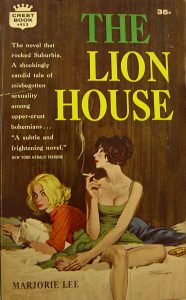 The Lion House, Marjorie Lee (1959, Rinehart)
The Lion House, Marjorie Lee (1959, Rinehart)
“A shockingly candid tale of misbegotten sexuality…” (New York Herald Tribune) “the probable successor to Lolita…you might say Marjorie Lee has dramatized the Kinsey Report” (Hartford Times).
Would that were so! Here’s the shocking truth about this lesbian pulp: no lesbian sex. None. Not even some groping. It’s all come on (look at that cover!) and no delivery. I should have suspected something was amiss, when even Lucy Freeman (author of Fight Against Fears) told me in the forward that I was in for something Continue reading
Obsessive Lesbian Patterns
From 1942 to 1944, Barbara Deming worked for the Library of Congress as a film analyst. Her job was to go to the movies and take detailed notes about what she watched. By her own account, she saw a quarter of Continue reading
Distracted Lesbians with Cameras
One of my pet peeves about lesbian pulp fiction is how little attention the lesbians pay to career advancement. They have no work ethic — they’re always coming in late to the office in the morning or taking a sick day to nurse their hangovers. I think Beebo Brinker delivers less than a dozen pizzas in the course of Continue reading
Shutterbugs: Katie and Her Camera and Sharon James, Freelance Photographer
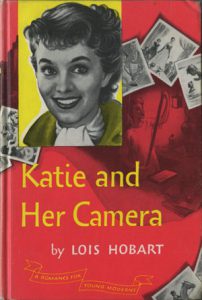 Katie And Her Camera (1955, Lois Hobart)
Katie And Her Camera (1955, Lois Hobart)
The Story: Dad has died and Katie has to get a job in order to finish college (a weak or absent patriarch is always a good excuse for a career). Inexperienced Katie applies for a part-time job as assistant to photographer Rolfe Esperson, who not only hires her but proceeds to teach her everything he knows, loans her his equipment, and pays her to boot. At one point he says she looks worn out and gives her a hundred dollars with instructions to go on Continue reading
The Wonderful World of Work
Maureen Corrigan, in her review of recent novels about the unemployed, started by saying that historically “the workaday world…has been considered too mundane to be of much interest.” Poor Maureen–another otherwise well-read person completely unaware of the world of Career Girl books. I’m talking about books like Betty Loring, Illustrator (1948), Patti Lewis, Home Economist (1956), and A Flair for People (1955–the heroine is a personnel director). Despite growing up with the Beany Malone books (which she analyzes in her memoir Leave Me Alone, I’m Reading, Maureen somehow missed out on books like Date With A Career (1958), and Phoebe’s First Campaign (1963). Continue reading
Career Girls, 1942 Style
There was a double feature playing a few nights ago, Laura and Bedelia, both based on books by Vera Caspary. I was so exhausted from the grueling Noir City Film Festival pace (four movies on Saturday) that I thought I’d skip the movie version of Laura (which I’ve seen more times than I can remember) and read the book instead. Continue reading
Dating Advice
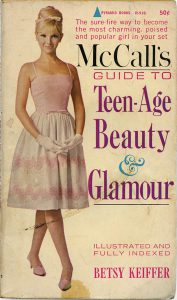
Once you learn what it is about yourself that needs improving, there's no longer any reason to feel helpless or hopeless.
I watched The Bachelor a few days ago, probably for the last time. It turns out my enjoyment of the premiere episode had more to do with being on vacation and seeing old friends than the show’s intrinsic qualities; and like the pleasure of watching HGTV every night in the hotel room, is not to be recaptured now that I’m back in my normal surroundings. On Monday night after the host advised the assembled women to make the most of whatever fleeting moments of contact they had with the bachelor, I found myself asking, “How could you ever hope to have even a semi-normal interaction in these circumstances?” — a question which I realize is very much beside the point. Continue reading

